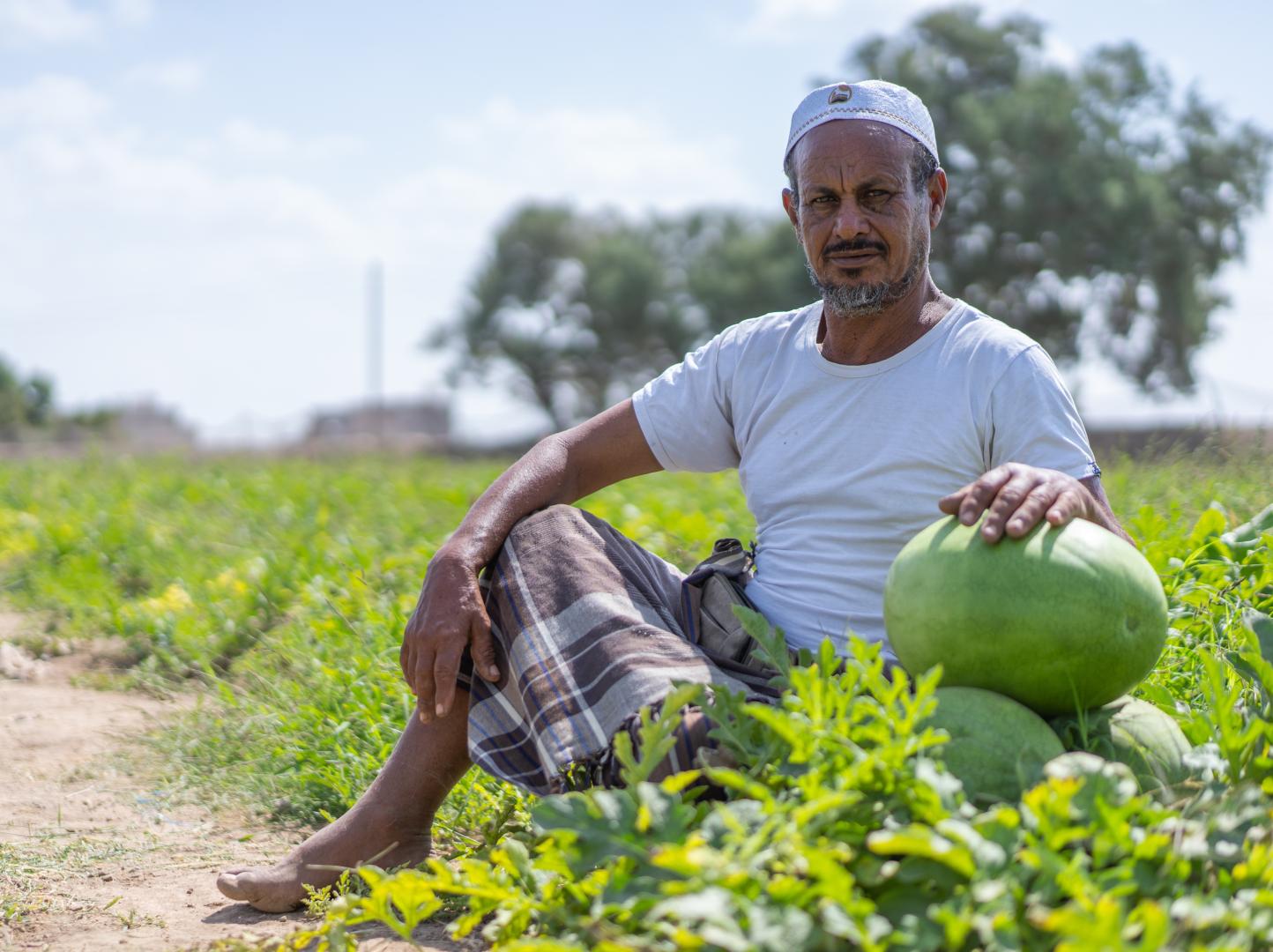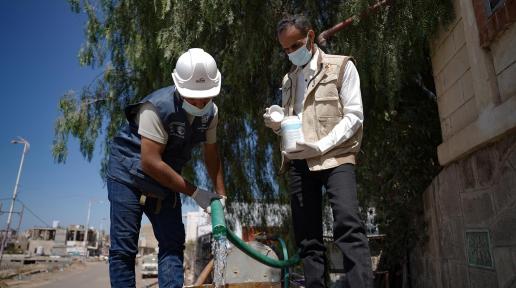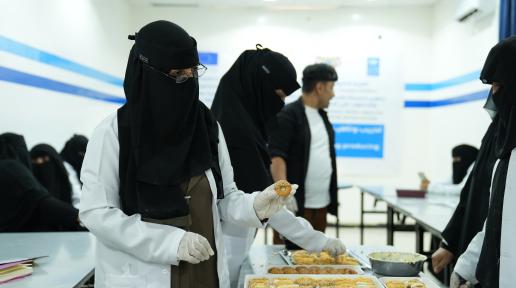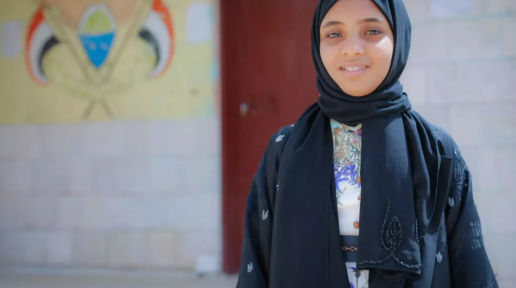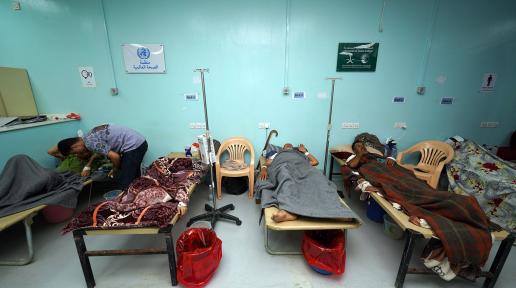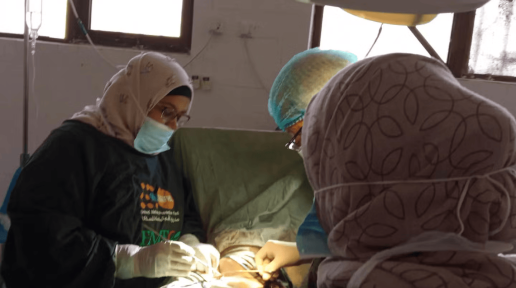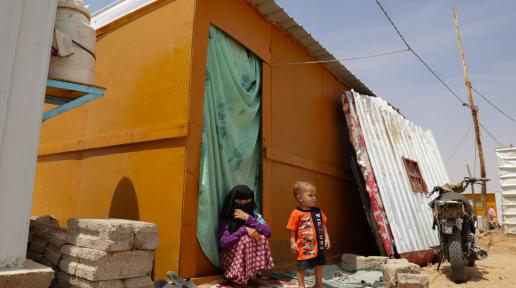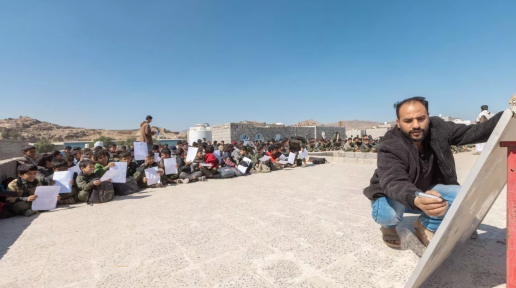Story
07 July 2025
UNDP Yemen: Marking Nearly a Decade of Building Community Resilience in Rural Yemen
For nearly a decade, the Enhanced Rural Resilience in Yemen (ERRY) Joint Programme has provided programming to bolster resilience and build back better in Yemen’s most vulnerable rural communities. Spanning three progressive phases from 2016 to 2025, ERRY programming was implemented across 37 districts in eight governorates, and reaching more than 2.1 million people through direct and indirect interventions.Funded by the European Union and the Government of Sweden, and implemented through a partnership of the United Nations Development Programme (UNDP), the Food and Agriculture Organization of the United Nations (FAO), the World Food Programme (WFP), and the International Labour Organization (ILO), the ERRY Joint Programme combined humanitarian assistance, development programming, and peacebuilding into one cohesive and community-centered approach.“The European Union has stood by the Yemeni people through the ERRY Joint Programme for nearly a decade - dedicating efforts not only to recovery, but to resilience, livelihoods, and long-term peacebuilding,” said Gabriel Munuera Vinals, EU Ambassador to Yemen.Anna Guittet, Counsellor and Regional Programme Manager for Yemen at the Embassy of Sweden, echoed this vision: "Sweden is proud to have supported a programme that empowers local communities and institutions to lead their own recovery. ERRY reflects our belief that lasting resilience must come from within."
Improving food security and agricultural resilience In the face of Yemen’s widespread food insecurity, the ERRY joint programme tackled both immediate hunger and long-term agricultural sustainability. Over 32,000 families received food support through food assistance for assets (FFA) while rehabilitating essential community infrastructure such as irrigation canals, feeder roads, water catchments, and agricultural terraces.To boost food production and restore rural livelihoods, the programme supported 42,500 farmers with improved seeds, tools, and inputs, and provided 47,550 livestock keepers with feed and veterinary care. Additionally, 34,900 farmers were trained in climate-resilient agricultural practices, including organic fertilization, crop diversification, and livestock fattening.In the dairy sector, 9,848 mostly women producers were supported, with the establishment of 10 dairy collection centers and 10 food processing facilities that enhanced both income and nutrition. As a result, the percentage of households in targeted areas reporting acceptable food consumption increased from 26% to 53%.“Before, I couldn’t afford to grow watermelon - diesel was too expensive, and the plants kept dying,” said Hussam, a 54-year-old farmer from Lahj. “Now, with the drip irrigation system and solar-powered pump I received, everything has changed. I’m growing more, spending less, and even expanding to new land. It brought my farm - and my hope - back to life.” Restoring livelihoods and economic opportunities The ERRY Joint Programme helped shift communities away from aid dependency by enabling them to generate their own income. More than 10,900 small businesses were launched, 45% of them led by women. Additionally, 7,000 youth received technical and vocational training in areas such as solar energy, mobile phone repair, tailoring, and appliance maintenance.These efforts yielded fast and tangible outcomes: 70% of new businesses reported results within three months, and 72% of families reported that they had developed a sustainable source of income.“The support I received through the ERRY Joint Programme turned my dream into reality. With my own camera, I’m not just taking photos—I’m telling stories, earning an income, and helping support my family,” says Abeer, a young photographer from Al-Maafer District, Taiz Governorate. Empowering women as economic and social leaders Beyond supporting thousands of women-led businesses, the ERRY Programme provided more than 12,500 women with training and financial support to launch sustainable income-generating activities. Around 2,800 women received agricultural inputs and equipment, enabling them to participate fully in local food production.Women were also active in local governance and peacebuilding. They accounted for 40% of all participants in community planning and dialogue processes, and 3,950 contributed directly to the development of local resilience plans. More than 100 women were trained as community mediators and trainers.“What motivates me is people’s suffering. When we work together, we can overcome anything—and build a better future for all,” said Rawda, a community coordinator in Al-Ma’afer, Taiz, who led local development across 40 villages. Expanding access to clean energy and climate-smart solutions To address energy poverty and climate vulnerability, the ERRY Programme installed 565 solar energy systems in schools, health centers, and vocational training institutes in Yemen. Twelve solar-powered irrigation schemes were introduced, along with two larger renewable energy plants — one solar-powered desalination unit and one hybrid solar-wind station.To ensure long-term maintenance, 100 staff were trained in solar system operation. ERRY also helped create a clean energy market by supporting 700 small energy enterprises and certifying 128 solar technicians. Furthermore, 7,000 farmers were trained in climate-smart agriculture and water management, while 1,000 households received drought-tolerant seeds.“With the solar system, everything is easier—the pumps work smoothly, the costs are lower, and people finally have clean water. This project didn’t just solve a problem; it transformed our daily lives.” Ahmed, Operation and Maintenance Officer, Al Maqaterah District, Lahj Governorate. Reinforcing local governance and access to basic services Strengthening community leadership was at the core of the ERRY Programme’s resilience model. A total of 811 village cooperative councils and 107 sub-district committees were activated and trained to lead local planning. These bodies developed 918 community resilience plans prioritizing development needs.The programme rehabilitated 1,585 community infrastructure projects — including schools, roads, water systems, and health facilities — many through cash-for-work and food-for-assets schemes. These efforts led to 85% of beneficiaries reporting improved access to basic services.Over 8,200 committee members, nearly half of them women, were trained in planning, coordination, and project management.“Before this project, we had no real health unit- just a room used by the school guard. Now, we have a proper facility with essential tools, allowing us to serve mothers and children in our community and reduce their need to travel far for care,” says Hanan Saleh, a community health volunteer at the rehabilitated health unit in Lawder District, Abyan Governorate. Promoting social cohesion and local peacebuilding Given Yemen’s protracted conflict and the current internal displacement of thousands of families, ERRY invested in grassroots peacebuilding. The programme trained 1,046 local mediators in conflict resolution, organized 265 dialogue sessions, and supported 81 community-led peace projects.These efforts contributed to a 70% increase in community cohesion and trust, according to local councils and civil society organizations. ERRY also facilitated over 1,000 self-led initiatives that addressed local priorities — from infrastructure repair to conflict prevention.“I was shy and hesitant to speak, even in front of women, but with the training I received through the programme, I gained the skills to communicate, negotiate, and build cohesion across dividing lines,”says Faten, reflecting on how the ERRY Joint Programme empowered her as an insider mediator in Bani Amer Village, Lahj Governorate. Leaving a lasting impactWhile the ERRY Joint Programme formally ended in June 2025, the systems, skills, and services it helped build remain embedded in the communities it served - offering a foundation for a more resilient and peaceful Yemen.“UNDP is grateful to the European Union and Government of Sweden for their partnership to enhance food security, livelihoods opportunities, renewable energy usage, and inclusive governance across vulnerable communities in Yemen,” said Zena Ali Ahmad, UNDP Yemen Resident Representative. Learn more about ERRY Joint Programme resilience efforts through visiting The Impact Report.
Improving food security and agricultural resilience In the face of Yemen’s widespread food insecurity, the ERRY joint programme tackled both immediate hunger and long-term agricultural sustainability. Over 32,000 families received food support through food assistance for assets (FFA) while rehabilitating essential community infrastructure such as irrigation canals, feeder roads, water catchments, and agricultural terraces.To boost food production and restore rural livelihoods, the programme supported 42,500 farmers with improved seeds, tools, and inputs, and provided 47,550 livestock keepers with feed and veterinary care. Additionally, 34,900 farmers were trained in climate-resilient agricultural practices, including organic fertilization, crop diversification, and livestock fattening.In the dairy sector, 9,848 mostly women producers were supported, with the establishment of 10 dairy collection centers and 10 food processing facilities that enhanced both income and nutrition. As a result, the percentage of households in targeted areas reporting acceptable food consumption increased from 26% to 53%.“Before, I couldn’t afford to grow watermelon - diesel was too expensive, and the plants kept dying,” said Hussam, a 54-year-old farmer from Lahj. “Now, with the drip irrigation system and solar-powered pump I received, everything has changed. I’m growing more, spending less, and even expanding to new land. It brought my farm - and my hope - back to life.” Restoring livelihoods and economic opportunities The ERRY Joint Programme helped shift communities away from aid dependency by enabling them to generate their own income. More than 10,900 small businesses were launched, 45% of them led by women. Additionally, 7,000 youth received technical and vocational training in areas such as solar energy, mobile phone repair, tailoring, and appliance maintenance.These efforts yielded fast and tangible outcomes: 70% of new businesses reported results within three months, and 72% of families reported that they had developed a sustainable source of income.“The support I received through the ERRY Joint Programme turned my dream into reality. With my own camera, I’m not just taking photos—I’m telling stories, earning an income, and helping support my family,” says Abeer, a young photographer from Al-Maafer District, Taiz Governorate. Empowering women as economic and social leaders Beyond supporting thousands of women-led businesses, the ERRY Programme provided more than 12,500 women with training and financial support to launch sustainable income-generating activities. Around 2,800 women received agricultural inputs and equipment, enabling them to participate fully in local food production.Women were also active in local governance and peacebuilding. They accounted for 40% of all participants in community planning and dialogue processes, and 3,950 contributed directly to the development of local resilience plans. More than 100 women were trained as community mediators and trainers.“What motivates me is people’s suffering. When we work together, we can overcome anything—and build a better future for all,” said Rawda, a community coordinator in Al-Ma’afer, Taiz, who led local development across 40 villages. Expanding access to clean energy and climate-smart solutions To address energy poverty and climate vulnerability, the ERRY Programme installed 565 solar energy systems in schools, health centers, and vocational training institutes in Yemen. Twelve solar-powered irrigation schemes were introduced, along with two larger renewable energy plants — one solar-powered desalination unit and one hybrid solar-wind station.To ensure long-term maintenance, 100 staff were trained in solar system operation. ERRY also helped create a clean energy market by supporting 700 small energy enterprises and certifying 128 solar technicians. Furthermore, 7,000 farmers were trained in climate-smart agriculture and water management, while 1,000 households received drought-tolerant seeds.“With the solar system, everything is easier—the pumps work smoothly, the costs are lower, and people finally have clean water. This project didn’t just solve a problem; it transformed our daily lives.” Ahmed, Operation and Maintenance Officer, Al Maqaterah District, Lahj Governorate. Reinforcing local governance and access to basic services Strengthening community leadership was at the core of the ERRY Programme’s resilience model. A total of 811 village cooperative councils and 107 sub-district committees were activated and trained to lead local planning. These bodies developed 918 community resilience plans prioritizing development needs.The programme rehabilitated 1,585 community infrastructure projects — including schools, roads, water systems, and health facilities — many through cash-for-work and food-for-assets schemes. These efforts led to 85% of beneficiaries reporting improved access to basic services.Over 8,200 committee members, nearly half of them women, were trained in planning, coordination, and project management.“Before this project, we had no real health unit- just a room used by the school guard. Now, we have a proper facility with essential tools, allowing us to serve mothers and children in our community and reduce their need to travel far for care,” says Hanan Saleh, a community health volunteer at the rehabilitated health unit in Lawder District, Abyan Governorate. Promoting social cohesion and local peacebuilding Given Yemen’s protracted conflict and the current internal displacement of thousands of families, ERRY invested in grassroots peacebuilding. The programme trained 1,046 local mediators in conflict resolution, organized 265 dialogue sessions, and supported 81 community-led peace projects.These efforts contributed to a 70% increase in community cohesion and trust, according to local councils and civil society organizations. ERRY also facilitated over 1,000 self-led initiatives that addressed local priorities — from infrastructure repair to conflict prevention.“I was shy and hesitant to speak, even in front of women, but with the training I received through the programme, I gained the skills to communicate, negotiate, and build cohesion across dividing lines,”says Faten, reflecting on how the ERRY Joint Programme empowered her as an insider mediator in Bani Amer Village, Lahj Governorate. Leaving a lasting impactWhile the ERRY Joint Programme formally ended in June 2025, the systems, skills, and services it helped build remain embedded in the communities it served - offering a foundation for a more resilient and peaceful Yemen.“UNDP is grateful to the European Union and Government of Sweden for their partnership to enhance food security, livelihoods opportunities, renewable energy usage, and inclusive governance across vulnerable communities in Yemen,” said Zena Ali Ahmad, UNDP Yemen Resident Representative. Learn more about ERRY Joint Programme resilience efforts through visiting The Impact Report.
